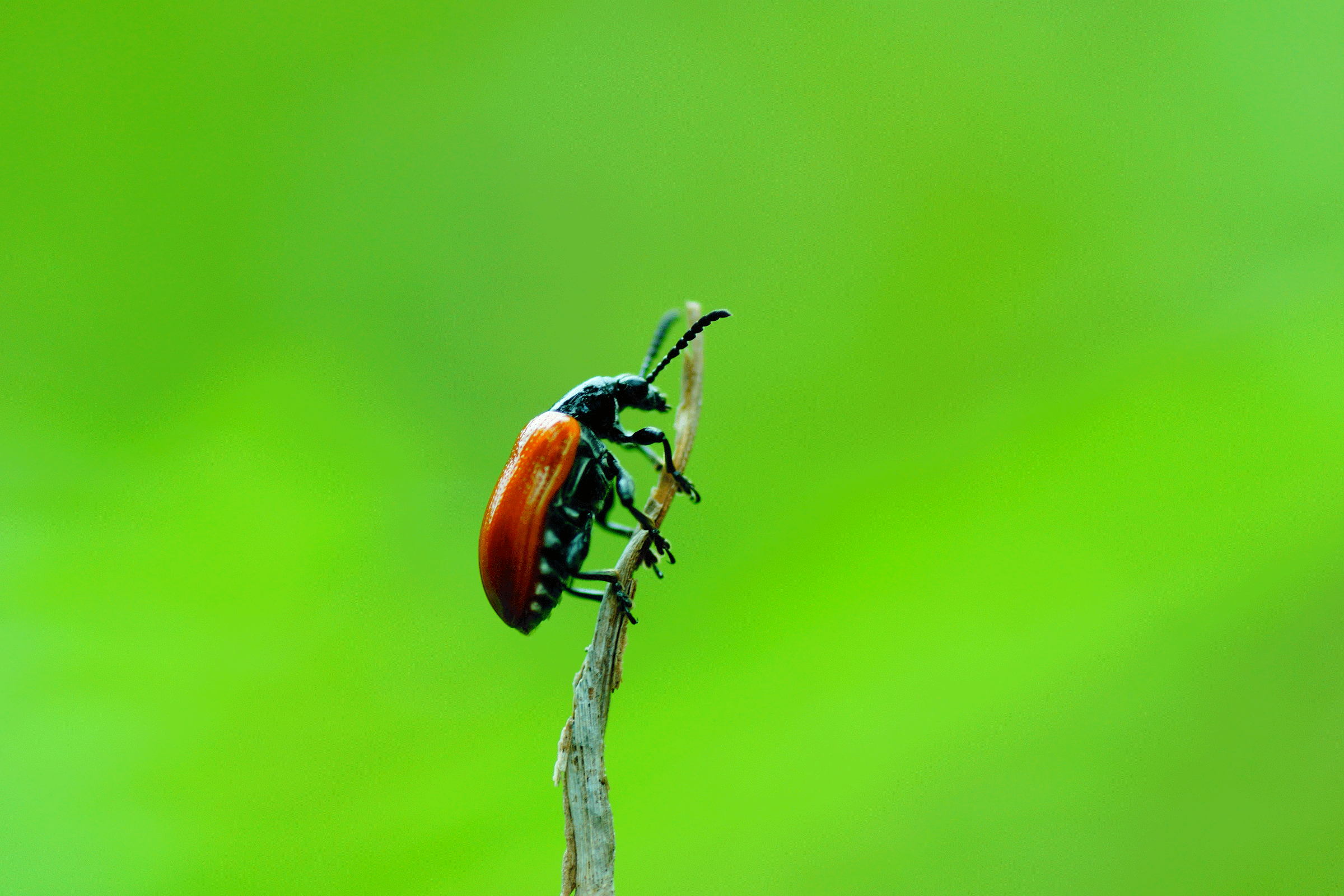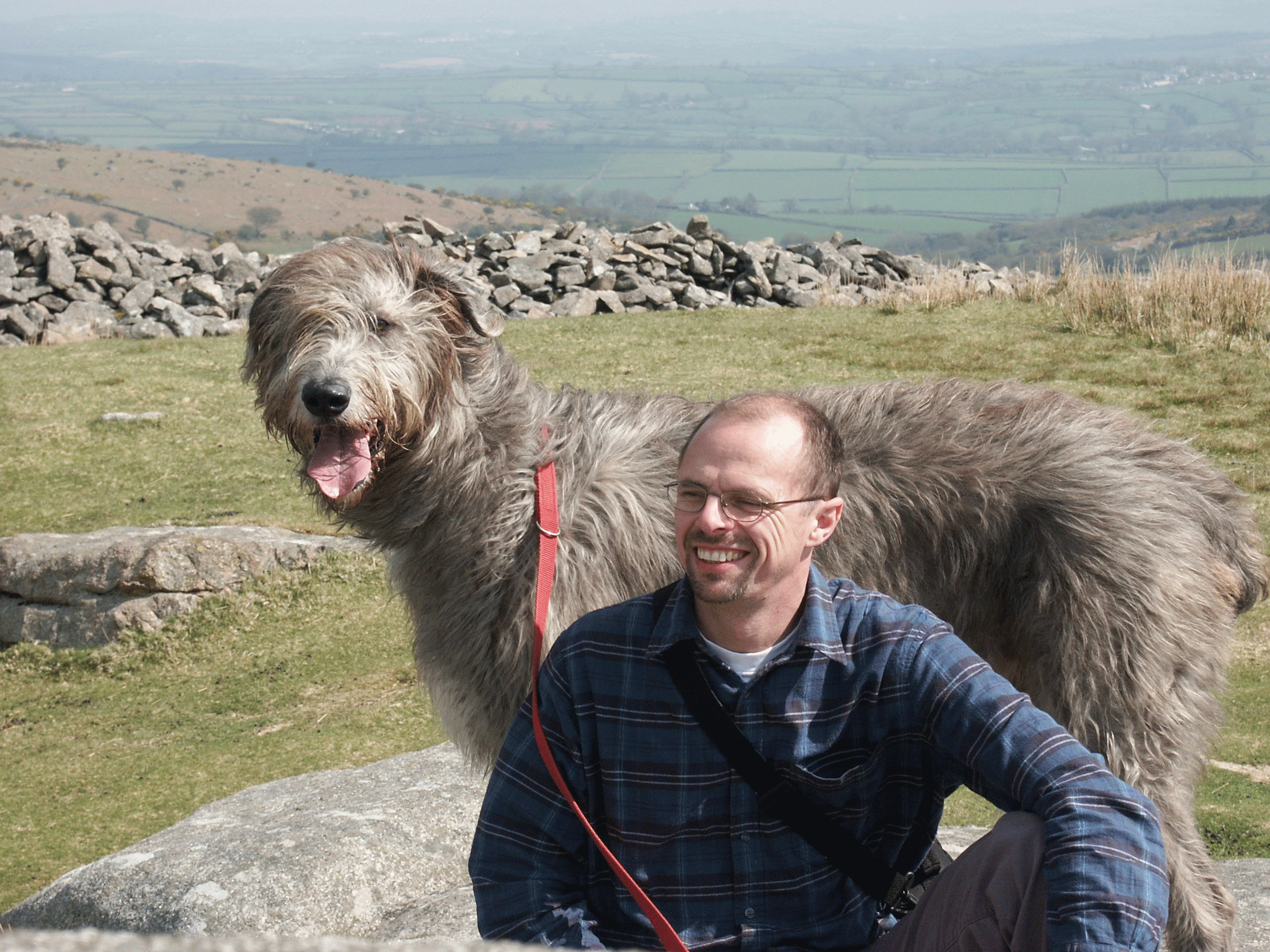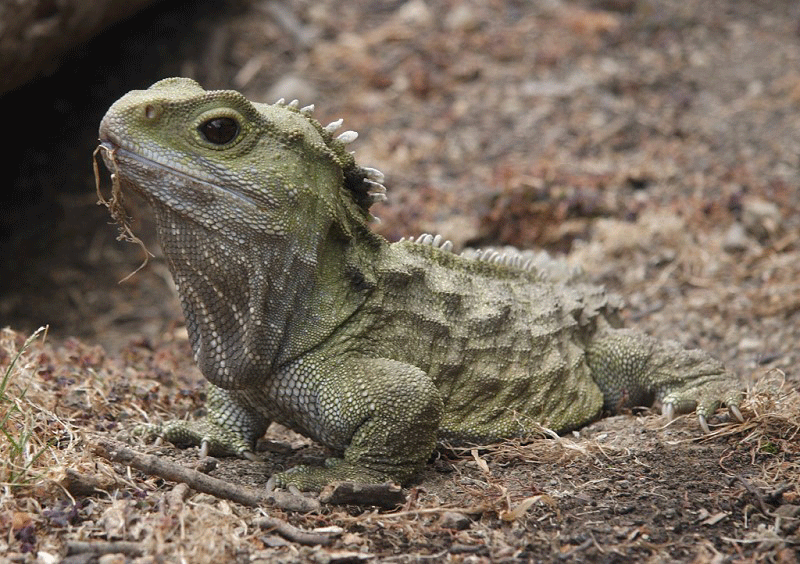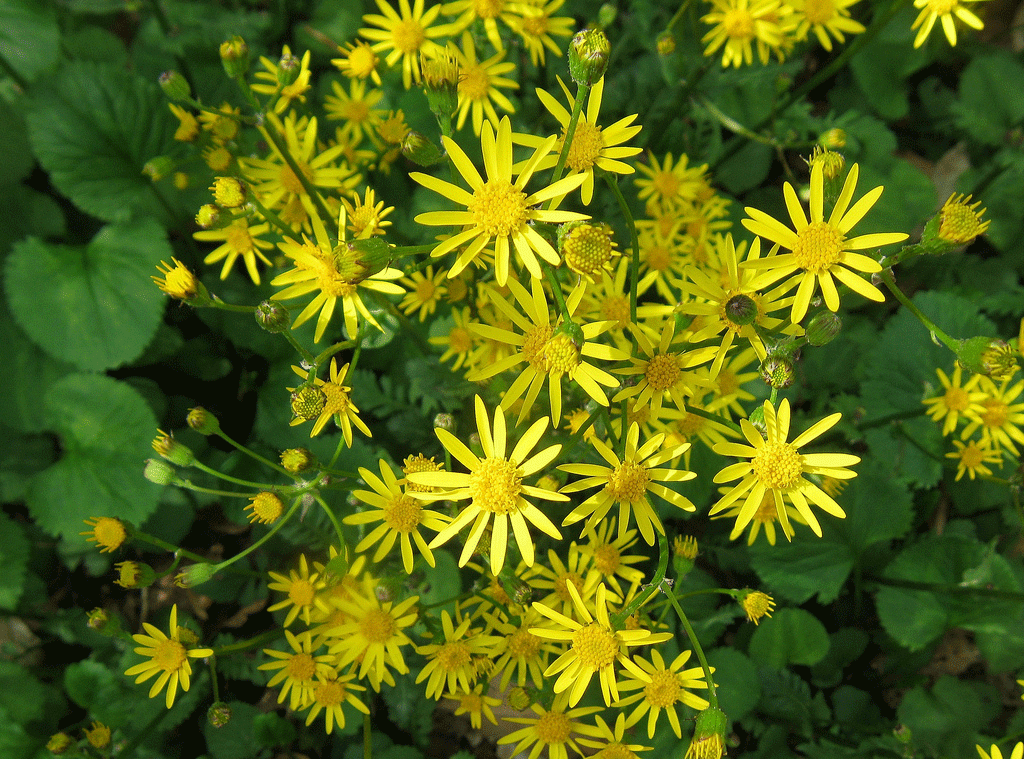Evolution in the Age of Mass Extinction
Air Date: Week of May 9, 2014

The Scarlet Lily Beetle is reviled by gardeners for eating lilies. But it’s a beautiful bug in its own right! (photo: Vengolis, Creative Commons 3.0)
From climate change to habitat destruction, humans are causing species to die out at alarming rates all around the world. But as biologist Chris Thomas tells host Steve Curwood, the pressure on ecosystems today is also leading to a surge in adaptation and evolutionary diversity.
Transcript
CURWOOD: It's Living on Earth, I'm Steve Curwood. Many scientists believe that the Earth is undergoing mass extinction number six, this time not due to a random meteor, but at the hands of humanity. So the other day we reached out to Chris Thomas, an evolutionary biologist at York University in the UK because we'd read that he sees some positive aspects in these grim circum-stances. And Chris Thomas joins us now on the line from England. Welcome to Living on Earth.
THOMAS: It's a pleasure to talk to you.
CURWOOD: What do you think of the idea that we're entering a major extinction period?
THOMAS: I think that's very likely. We're seeing unprecedented extinction rates at the moment, and the rates at which we're changing the planet's climate, altering the world's vegetation to pro-duce our food, which obviously we need, polluting with nitrogen. So you see these effects all over the planet, and although they seem quite gradual in a way, if you sit back and think, "Well, humans have been around for a while, suppose they're around for another few hundred years to a few thousand years", just the rates of change you see at the moment are enough to cause a fairly major extinction event.
CURWOOD: But you put a silver lining on this black cloud.
THOMAS: Well, it's a slightly dull silver lining in the sense that a lot of this is going to take place long after we're buried and forgotten, I suspect. Well, what I see is that as we change the environment right across the world, this produces new opportunities for some of the species that exist now, and also provides new opportunities for new things to evolve that will be able to make use of the new environments that we're creating. So just as we see a mass extinction that appears to be emerging because of us, because of our activities, similarly we may see a huge sort of orig-ination and explosion, if you like, of new ecosystems and new species that arise into the envi-ronments that we have changed.
CURWOOD: To what extent are we seeing this growth of biological diversity right now?
THOMAS: Surprisingly, a huge amount. But generally, we almost don't see it as that. We think, well, it's changed from how it was in the past, therefore it's bad, and therefore we see it almost as a loss even when it’s a gain in front of our eyes. So there are two kinds of process that are really giving rise to this. First is what I call ecological diversification, and the second is the evolution-ary diversification.

Chris Thomas and his dog Rex (photo: Alice Thomas)
CURWOOD: Alright. Explain these to us. What do you mean by ecological diversification?
THOMAS: So ecological diversification. If you start off in an originally forested landscape, and you turn half of it into pastures, then you provide new ecological opportunities for species that like open habitats to live in that area. So although the diversity of the forest doesn't go up, it probably goes down a bit, the total diversity of the region can actually increase, because you've now got several types of habitat where you used to have just one. The other major effect that we're having is through introducing species to new parts of the world. In Britain, we've had be-tween 1,500 and 2,000 species added to particularly on the plant side, but the animals and plant diversity of Britain is now higher than it used to be. Now the remarkable thing is that none of the native species have actually died out completely from Britain as a result of these new arrivals, so the whole diversity of the country is now much larger.
CURWOOD: So a bit of immigration leads to some more diversity, huh?
THOMAS: Yes, but it's not all positive. So if you introduce mammalian predators, rats and cats and things like that along with humans, to oceanic islands where all the species there have never met a mammalian predator before in their evolutionary history, these predators arrive and the native birds and so on simply don't know what to do them, and they get driven to extinction very fast. So it isn't a universal thing, but on average, when you add a new species to a region, you tend to have a net increase in number of species because for every new species that you add, less than one of the existing species dies out.
CURWOOD: Let's talk about the evolutionary side of this. Talk to me about some of the new species, or some of the broader biological diversity that we're seeing right now.
THOMAS: Well, I can give you almost a little sort of mini-historical story where botanical col-lectors collected something which subsequently became known as Oxford Ragwort. It was a plant, a yellow flower, a plant related to the daisies and to ragwort itself which grew on Mount Vesuvius in Italy. And they brought it back and they cultured it in the botanical garden, and it took a very long time to gradually spread through the city of Oxford.
But eventually it did, and it likes growing in disturbed places so the city is quite a good place for it, and eventually it got to the railway station. Once it got to the railway station, all hell let loose because the seeds are very light. They can be blown in the wind. And they got caught in the vor-tices behind the trains, and they were moved from station to station because it likes stony ground and disturbed places. All the railway stations it turned up at were themselves ideal locations for this plant to grow, so it just spread around the country. And it was living in a habitat where there were no real native species living there, so it was just adding to the country's biodiversity without causing any damage.
But then what happened was it in a few places it ended up hybridizing with groundsel which is sort of a distantly-related species but they can hybridize, and at least three of these hybrids ended up becoming sufficiently genetically distinct that you can now think of them as species in their own right. So we've now got four new ragwort-groundsel species and they've added to British diversity and in fact through these hybridizations they've added to world diversity.
CURWOOD: You've talked about flora, what about fauna, what about animals that are changing right in front of our eyes?

The Tuatara is one of the most genetically distinct species on earth. Chris Thomas thinks that species like this should be of top priority when it comes to saving (Knutschie, public domain)
THOMAS: Yes, so there's a couple of native plant feeding insects in North America which it turned out hybridized. Now, these hybrids were able to live on introduced and so-called invasive European honeysuckles. So this species has now spread and so we've added one more species of insect to the world, and it's feeding on a plant that people thought was a bit troublesome. And so it's probably rather a good thing.
CURWOOD: Have you found any new insects that like kudzu?
THOMAS: You can pretty much guarantee that any plant that's causing a problem somewhere is going to have some native species within its historical range that's capable of feeding on it. And this, of course, is the basis for biological control programs. Of course, sometimes, when we in-troduce plants, the insects arrive and then people don't like them. We've got a beautiful lily beetle which I believe has colonized North America as well as northern Europe that feeds on garden lilies and to me as an insect ecologist it’s an absolutely beautiful insect, this orangey color, but it does rather devastate your prize lilies, and so gardeners are very upset about this.
Some species, when they arrive, if people sort of hate them, others if they think they're bio-control because it's reducing something you don't like, they're great things, but they're just spe-cies. So, I'm not really saying any of this is good or bad, what I'm observing is that if we look across the planet both through the ecological processes of insects following the plants that they eat on, hybridization, species just evolving when new opportunities arise that they can exploit, that what we're starting to see is this emergence of a new diversity which is rather strongly associated with human activities.
CURWOOD: So, what's you take on then on the whole concept of invasive species, and the fear that people tend to have around them? I'm wondering if you see this as perhaps just a fear of change, a desire to just keep things the way they are when maybe in your view nature doesn't work that way?
THOMAS: Well, in the long run, nature absolutely does not work in that way. I know most people think that 21,000 years ago is rather a long time ago, but in terms of the history of life on Earth, it's not even yesterday. You can imagine yourself back to 21,000 years ago in the middle of the last ice age, almost none of the species that you would see where you are right now would be the same. The whole of the new vegetation where all the animals are now is new compared to what it was just 21,000 years ago. And so, if you start thinking about invasive species, well, everything is an invasion on this time scale.
CURWOOD: Professor, what do you think of what we're seeing around the world in terms of these dramatic and sometimes heroic efforts to save particular species of plants and animals. I'm thinking in particular of scientists in the Arctic that have begun to advocate for human feeding of wild Polar bears. What do you think about things like that?
THOMAS: I think it's not a bad holding position, let's say. We are driving lots of species extinct. The difficulty is though that we tend to choose the most spectacular to take these actions for, most of the species that are going extinct are insects, plants that are very rare, many of which would just disappear and hardly anyone would notice.
So I'm all in favor of trying to maintain wild populations of species particularly if there's some hope that these species might be able to make a go of it again without having to take these interventions. So if it's a holding operation for 100 years or so, then fine. If it's absolutely indefinite, well, one's got to ask what should we prioritize in terms of saving.
And, for that, I would argue we should be thinking particularly about things that are evolutionarily very very distinct. So something like a Tuatara from New Zealand, which is a kind of reptile, it kind of looks like a regular big lizard but actually, evolutionarily it's almost as different as the lizards and the dinosaurs are from one another. This is a bit of our evolutionary history, and I would strongly advocate for keeping those organisms alive and the genetic knowledge that is associated with them.
CURWOOD: So, in the context of climate disruption, people are pointing to a lot of plants and animals that are going to go away and kind of quickly. Should we attempt to save as much as we can, or essentially roll with it?

Common groundsel (pictured above) has hybridized with Vesuvius Ragwort to create a new species in Britain (photo: Pauline Rosenberg, Creative Commons 2.0)
THOMAS: Environmental change is absolutely inevitable. It's been going on steadily for the last century, in fact, it's been going on for much longer than that, and I think what we should be thinking about in an environmental context is how we live with that change rather than our start-ing point simply and always be to try and keep things exactly as they are or go back to some im-agined past type of ecosystem. It isn't going to be done. We're going to lose if that is our ap-proach.
If we try to keep things the way they were, then for example, as the climate changes, helping species move to new areas where they may be able to thrive in the future, would be off the agen-da because that would be making things less like the past. But it may still be saving species. And these more flexible approaches are maximizing opportunities as well as minimizing harms. I would think that's the way to go.
CURWOOD: Some people listening to you might say that you're saying, hey, everything's going to be OK. We could keep on going because nature's going to evolve and adapt and we shouldn't worry. To what extent are you concerned that people are going to take your message as license to keep on polluting, just keep on consuming?
THOMAS: That's not what I feel. I think if we end up wiping out, say, a quarter of the species, maybe slightly more, I think from an individual personal perspective that's a tragedy. I think from some sort of a utilitarian perspective, it's one hell of a waste of biological material that might have been of use to humanity at some point in the future, so I think it's a kind of madness, I think it's a shame.
What I'm really saying is that as we're living through what appears to be mass extinction caused by us, it's also extremely interesting to see just the beginnings of the shoots of recovery. It's not necessarily all rosy whatsoever, but it is a very interesting evolutionary and ecological phenome-non that as we modify and transform the planet in a enormous number of ways, the biological diversity is ready to give it a go of seeing what it can do with these new conditions.
CURWOOD: Chris Thomas is a Professor of Conservation Biologist at University of York in the UK. Thanks so much, Professor, for joining us.
THOMAS: You're very welcome.
Links
Living on Earth wants to hear from you!
Living on Earth
62 Calef Highway, Suite 212
Lee, NH 03861
Telephone: 617-287-4121
E-mail: comments@loe.org
Newsletter [Click here]
Donate to Living on Earth!
Living on Earth is an independent media program and relies entirely on contributions from listeners and institutions supporting public service. Please donate now to preserve an independent environmental voice.
NewsletterLiving on Earth offers a weekly delivery of the show's rundown to your mailbox. Sign up for our newsletter today!
 Sailors For The Sea: Be the change you want to sea.
Sailors For The Sea: Be the change you want to sea.
 The Grantham Foundation for the Protection of the Environment: Committed to protecting and improving the health of the global environment.
The Grantham Foundation for the Protection of the Environment: Committed to protecting and improving the health of the global environment.
 Contribute to Living on Earth and receive, as our gift to you, an archival print of one of Mark Seth Lender's extraordinary wildlife photographs. Follow the link to see Mark's current collection of photographs.
Contribute to Living on Earth and receive, as our gift to you, an archival print of one of Mark Seth Lender's extraordinary wildlife photographs. Follow the link to see Mark's current collection of photographs.
 Buy a signed copy of Mark Seth Lender's book Smeagull the Seagull & support Living on Earth
Buy a signed copy of Mark Seth Lender's book Smeagull the Seagull & support Living on Earth

